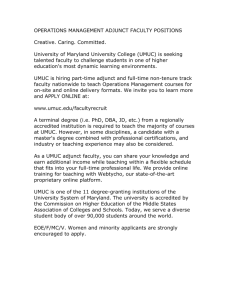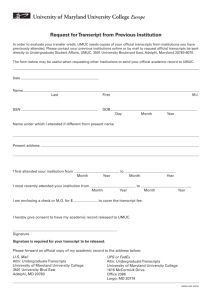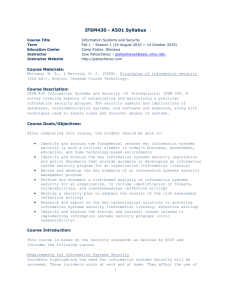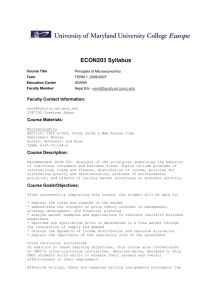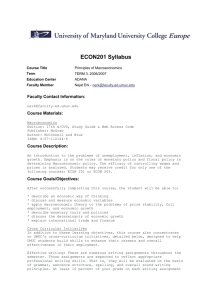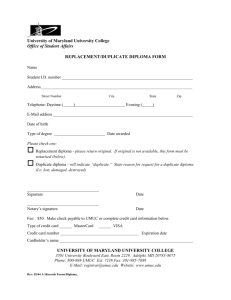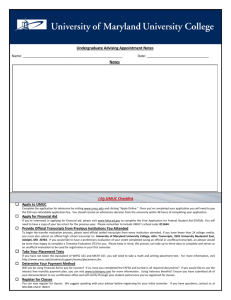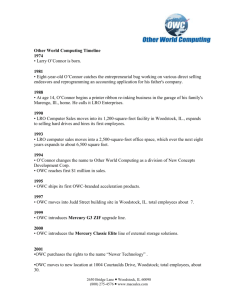Link to Paper - University of Wisconsin
advertisement
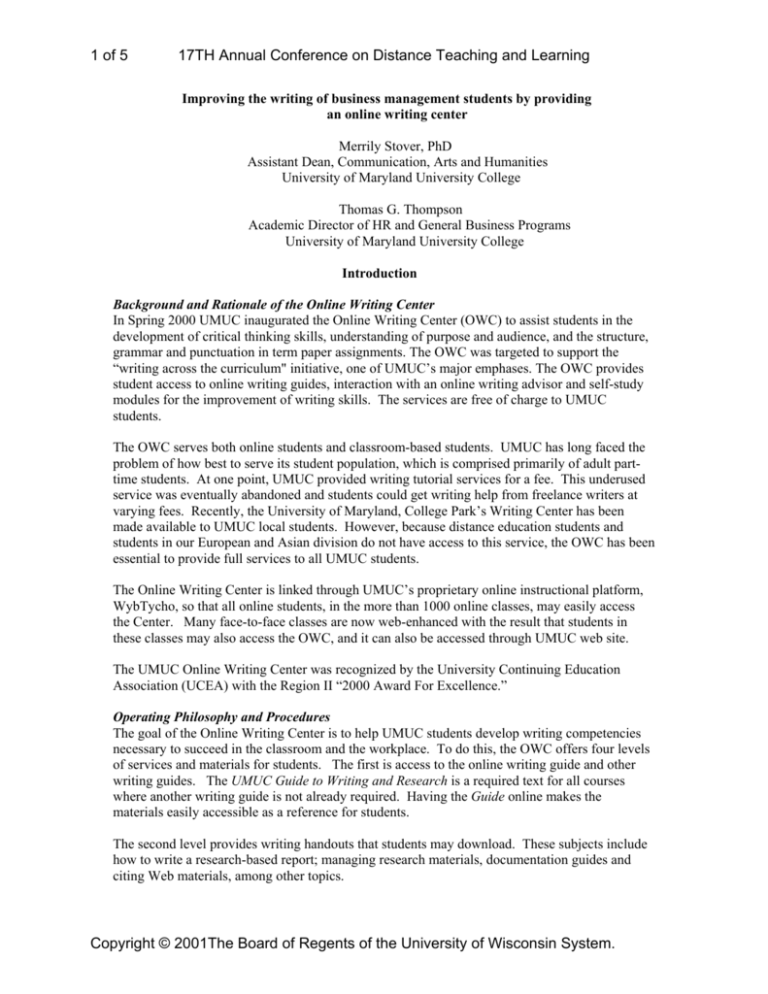
1 of 5 17TH Annual Conference on Distance Teaching and Learning Improving the writing of business management students by providing an online writing center Merrily Stover, PhD Assistant Dean, Communication, Arts and Humanities University of Maryland University College Thomas G. Thompson Academic Director of HR and General Business Programs University of Maryland University College Introduction Background and Rationale of the Online Writing Center In Spring 2000 UMUC inaugurated the Online Writing Center (OWC) to assist students in the development of critical thinking skills, understanding of purpose and audience, and the structure, grammar and punctuation in term paper assignments. The OWC was targeted to support the “writing across the curriculum" initiative, one of UMUC’s major emphases. The OWC provides student access to online writing guides, interaction with an online writing advisor and self-study modules for the improvement of writing skills. The services are free of charge to UMUC students. The OWC serves both online students and classroom-based students. UMUC has long faced the problem of how best to serve its student population, which is comprised primarily of adult parttime students. At one point, UMUC provided writing tutorial services for a fee. This underused service was eventually abandoned and students could get writing help from freelance writers at varying fees. Recently, the University of Maryland, College Park’s Writing Center has been made available to UMUC local students. However, because distance education students and students in our European and Asian division do not have access to this service, the OWC has been essential to provide full services to all UMUC students. The Online Writing Center is linked through UMUC’s proprietary online instructional platform, WybTycho, so that all online students, in the more than 1000 online classes, may easily access the Center. Many face-to-face classes are now web-enhanced with the result that students in these classes may also access the OWC, and it can also be accessed through UMUC web site. The UMUC Online Writing Center was recognized by the University Continuing Education Association (UCEA) with the Region II “2000 Award For Excellence.” Operating Philosophy and Procedures The goal of the Online Writing Center is to help UMUC students develop writing competencies necessary to succeed in the classroom and the workplace. To do this, the OWC offers four levels of services and materials for students. The first is access to the online writing guide and other writing guides. The UMUC Guide to Writing and Research is a required text for all courses where another writing guide is not already required. Having the Guide online makes the materials easily accessible as a reference for students. The second level provides writing handouts that students may download. These subjects include how to write a research-based report; managing research materials, documentation guides and citing Web materials, among other topics. Copyright © 2001The Board of Regents of the University of Wisconsin System. 2 of 5 17TH Annual Conference on Distance Teaching and Learning The third level of support is comprised of interactive self-study modules. These self-study modules enable students to test themselves on writing issues. Students may follow the self-study modules at their own speed in their own time. The handouts and the self-study modules are designed with the adult learner in mind, whose writing skills may be “rusty.” Topics for selfstudy modules include plagiarism, and common problems of writing. Others are in development. The fourth level is one-on-one review of students’ writing by Online Writing Center writing advisors. Writing advisors provide answers to quick writing questions as well as feedback on writing drafts. The feedback from the writing advisors is designed to preserve students’ ownership of their papers. Advisors give suggestions for improvement in the areas of critical thinking, organization, the mechanics of writing, and they model the editing of brief sections of papers. Students are left with the task of the overall editing and rewriting of their own papers. Writing advisors utilize assessment tools that were developed by an interdisciplinary committee of UMUC faculty and academic directors. The Online Writing Center is supervised by a PhD. graduate student under the direction of the Director of the Effective Writing Program. The OWC trains and supervises the writing advisors. Writing advisors are graduate students enrolled at the University of Maryland, College Park. The writing advisors handle student papers on weekdays as well as weekends throughout the year. The published turn-around time for review of writing assignments is 48 hours. The in-house goal is 24 hours. Requests for assistance from UMUC to the writing center are reviewed by the supervisor who assigns the papers to writing advisors. After the writing advisors have submitted their suggestions and worked with the student, the supervisor then reviews the work before the papers are returned to the students. Overall Results In the year since the Online Writing Center opened, writing advisors have served more than 500 students in improving their writing. Each semester, the number of students has risen substantially as students learn about the service. Advisors answer e-mail questions from students as well as helping directly with student papers. However, 90% of the requests involve exchanges of papers. Students seeking help with writing assignments have come from a variety of courses across the curriculum, including Behavioral and social Sciences, Business and Management, Computer Applications, Communication Studies, English, Prior Learning, Humanities, Information Systems Management, Paralegal Studies, Psychology, and Technology and Management. The Online Writing Center currently averages about 56 requests for help a day. The balance of this paper deals with the experience of students from the Business and Management area in testing the effectiveness of the Online Writing Center to improve their writing. The Business Management Pilot The Pilot Design A Management and Organization course was selected because the instructor was a member of the interdisciplinary committee that developed the assessment tools used by the Online Writing Center. The pilot ran in the spring, summer and fall terms, 2000 for different sections of the same course with the same instructor. The term paper accounts for 30% of course grade. Students were offered a 10- point bonus on their term paper grade if they used the OWC, and completed a questionnaire describing their experiences. This would add 3 percentage points to their total Copyright © 2001The Board of Regents of the University of Wisconsin System. 3 of 5 17TH Annual Conference on Distance Teaching and Learning course grade. The cooperating students were also given an extra week to complete and submit their paper. The Pilot Results The pilot appears to have been successful. Sixty four of ninety one (70.3%)students, over the three semesters, took advantage of the OWC pilot program. Table 1 below shows the differences in average term paper grades for the users and non-users of the OWC pilot program over the four semesters. Table 1 Comparison of Grades between users and non-users of the writing center. Users Av. Score Non-users Av. Score Spring 2000, sec. 1 Spring 2000, sec. 2 Summer 2000 Fall 2000 13 20 12 19 91.8 90.0 91.6 91.6 4 6 6 11 85.0 82.5 83.8 84.7 Total 64 91.1 27 84.1 The difference of 7 percentage points (8.3% difference) was relatively consistent across semesters and is significant at the .05 confidence level. The 10-point bonus for pilot participation is not included in these grades. A copy of the questionnaire administered and a tabulation of results by question are show in Table 2. Tabulations of the questionnaire showed that only 1 of the 64 students was aware of the center before this pilot. Even though the OWC opened in spring, 2000 the summer and fall students did not have an increased awareness. Ninety-two percent (59 of 64) felt the OWC responded in a timely manner. Approximately one-third of the participating students reported receiving significant feedback from the OWC in the clarification of ideas, organization, readability and grammar. Clarification of purpose, strengthened conclusions and citation help was reported by approximately one-fifth of participating students. On the average students reported three categories of useful feedback. Selected quotations from the student assessment of the type and quality of feedback provided: 1. “improved sentence structure and consistency of writing style ” 2. “significantly improved readability of paper in addition to providing support with difficult citations” 3. “clarified structure of paper, moderated use of technical language” 4. “clearer ideas, stronger arguments, grammar and conclusion” 5. “reduce wordiness, cut out unneeded sentences” 6. “organization and use of evidence” 7. “strengthened topic sentences to help reader better understand “ 8. “new set of eyes catches things I miss after reading several times: suggestion to read aloud helps me understand how it will come across to reader” 9. “gave ideas to add emphasis to the subject” Copyright © 2001The Board of Regents of the University of Wisconsin System. 4 of 5 17TH Annual Conference on Distance Teaching and Learning The participants were equally divided in terms of their perception of whether the OWC helped them understand the project and subject matter more completely. The students were unanimous in their willingness to use the Online Writing Center again. Table 2 Writing Center Questionnaire With Respondent Tabulations 1. Did you know about center before instructor announced the opportunity to earn extra credit? Yes_____1______ No____63_______ 2. Did the writing center respond to you in a timely manner? (within 48 hours) Yes____59_______ No____5_______ If no and there were extenuating circumstances please describe. 3. Indicate which of the following types of feedback you received from the writing center, and the degree to which you feel it helped you improve your final submission.. Clarification purrpose________23____________________________ Clarification of ideas/concepts_____35________________________ Organization of arguments and evidence______32_______________ Improved readability and/or clarity of presentation_______36______ Improved grammar and/or punctuation_______33________________ Strengthen your conclusion/recommendations________22_________ Assisted with citation protocol________24_____________________ 4. Did revising your paper based upon the writing center advisor's feedback help you understand you subject matter more completely? Yes_____31_______ No___30______ (3 no responses If Yes, Please Explain_____________________________________________ 5. Would you use the writing center again? Yes____64_______ No______0____ If yes, with any conditions?__________________________________________ The pilot project instructor looked at average term paper grades for semesters prior to this pilot. The definition of the term paper has been consistent over time. There was a small improvement in the average grade for the sections that used the Online Writing Center, but the assessment rubric(s) used to evaluate the term papers raised the grading standard so that a meaningful comparison is difficult. Conclusions and Recommendations The pilot program was successful by any of the metrics used for assessment. Caution should always be used in survey analysis in distinguishing between statistical and causal relationships. For example when examining the distribution of grades for users and non-users there were several weaker scores that accounted for most of the difference in average scores. The majority of the scores were similar. A plausible conclusion is that weaker students often don’t seek help even when it is in their best interest. An important factor that was highlighted by the questionnaire results is that more effort needs to be expended to inform students of the Online Writing Center. Two corrective actions were taken by placing a link in the options menu for every online course and by promoting the OWC actively in UMUC publications to students. Copyright © 2001The Board of Regents of the University of Wisconsin System. 5 of 5 17TH Annual Conference on Distance Teaching and Learning The administration at UMUC is confident that the Online Writing center contributes to the achievement of the “writing across the curriculum’ initiative. The current fifty-two inquiries per semesterday extrapolates to approximately 15,300 inquiries per year; which would represent approximately twenty-five percent of all UMUC students taking advantage of the Online Writing Center each year, if all the inquiries were from different students. Acknowledgement: Robert MacDonald, Director of the Effective Writing Program at UMUC, provided information about the logistics of the Online Writing Center, and assisted with points of emphasis. References Hobson, E. H., Ed. (1998). Wiring the writing center. Logan, Utah: University of Utah Press. Inman, J. A. and D. N. Sewall, Eds. (2000). Taking flight with OWLs: Examining electronic writing center work. Mahwah, N. J.: Erlebaum & Sons. Merrily Stover is Assistant Dean, Undergraduate Programs, at the University of Maryland University College (UMUC). A leader in distance learning in post secondary education, Dr. Stover’s area of purview includes the arts and humanities, amongst other disciplines. Dr. Stover also oversees the design and development of UMUC’s award winning Online Writing Center. Dr. Stover has presented numerous papers on distance and online learning to national and international audiences. An Anthropologist by training, Dr. Stover previously taught at the British Open University, Monterey Institute of International Studies, and the University of Hawaii. She currently teaches undergraduate courses online at UMUC. Merrily Stover, PhD. University of Maryland University College 3501 University Boulevard East Adelphi, MD 20783 Phone: 301-985-7877: Fax: 301-985-7698 E-mail: mstover@umuc.edu Thomas Thompson, Academic Director of HRM and General Business Programs at University of Maryland University College (UMUC), is responsible for curriculum development and staff hiring for both online and classroom-based business courses. He has been a project manager, an author, and a reviewer for the development of online courses as well as teaching classroom, webbased online, and interactive television courses. His dissertation-in-process on the management of web-based course development won the 2000 William Rainey Harper Research Grant Award.. Mr. Thompson has presented at over a dozen national and regional distance education conferences. Mr. Thompson previously taught at Johns Hopkins University, the Rotterdam School of Management, University of Maryland, Baltimore County, and Villa Julie College. Thomas G. Thompson. University of Maryland University College 3501 University Boulevard East Adelphi, MD 20783 Tel. 301-985-7788: Fax 301-985-7021 E-mail: tthompson@umuc.edu Copyright © 2001The Board of Regents of the University of Wisconsin System.
